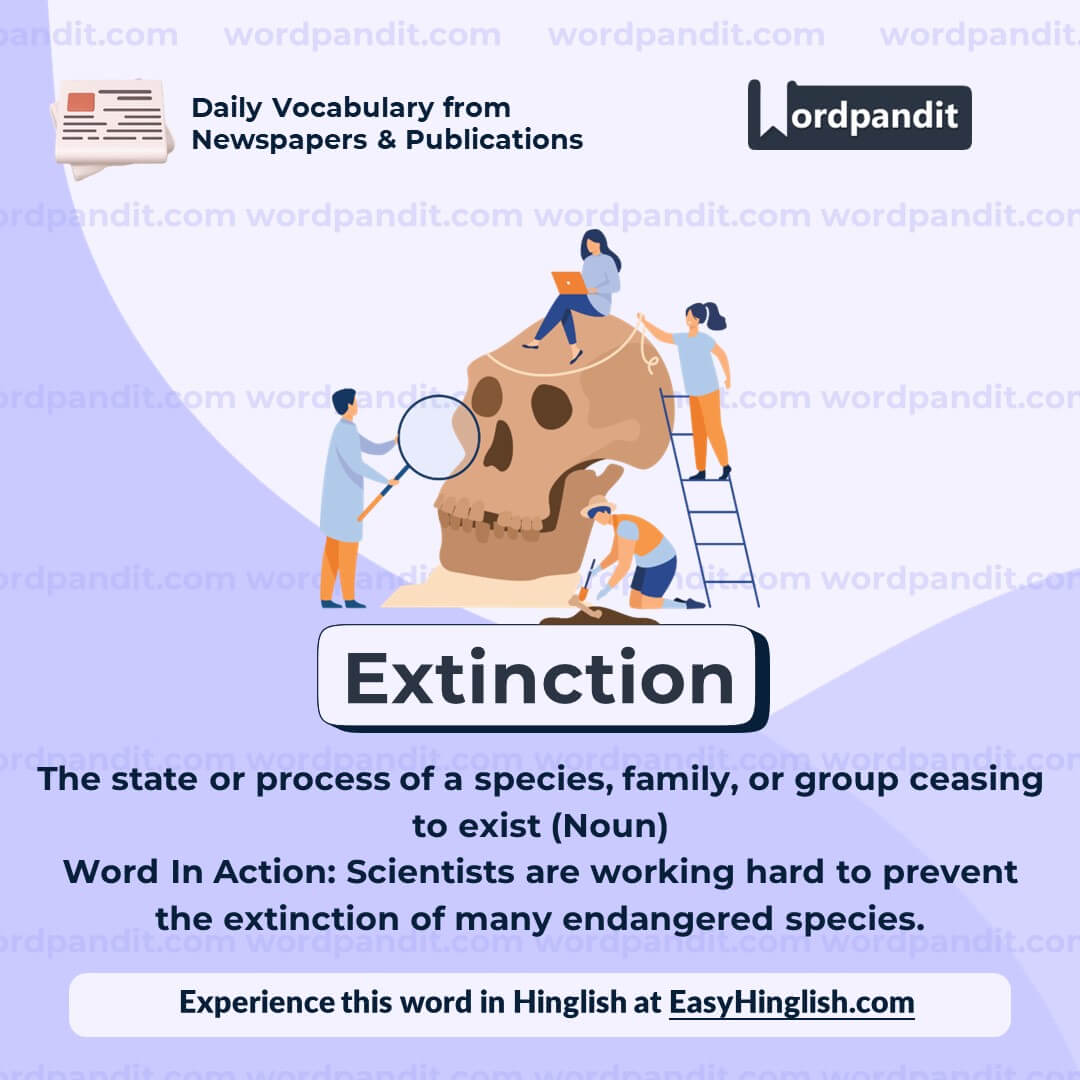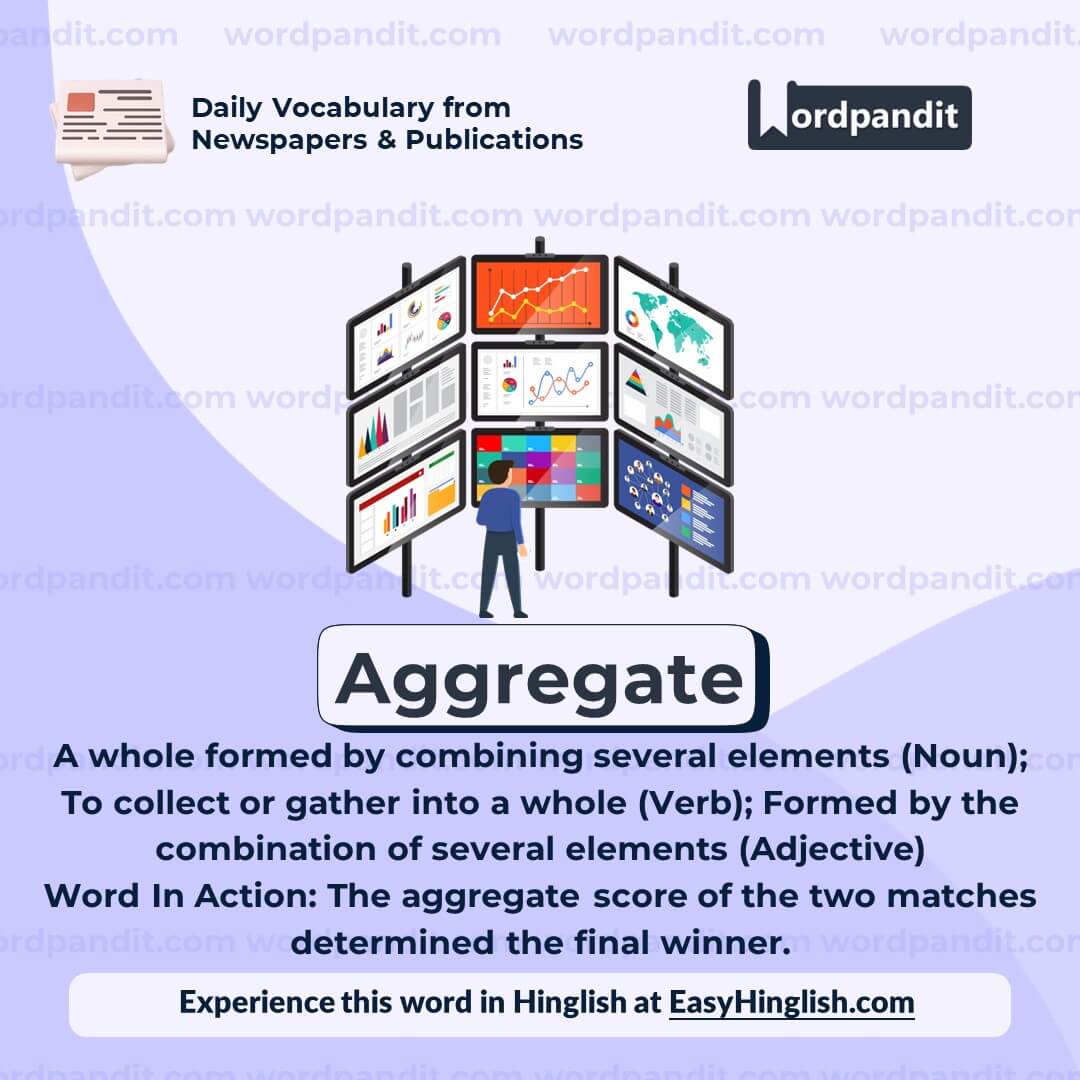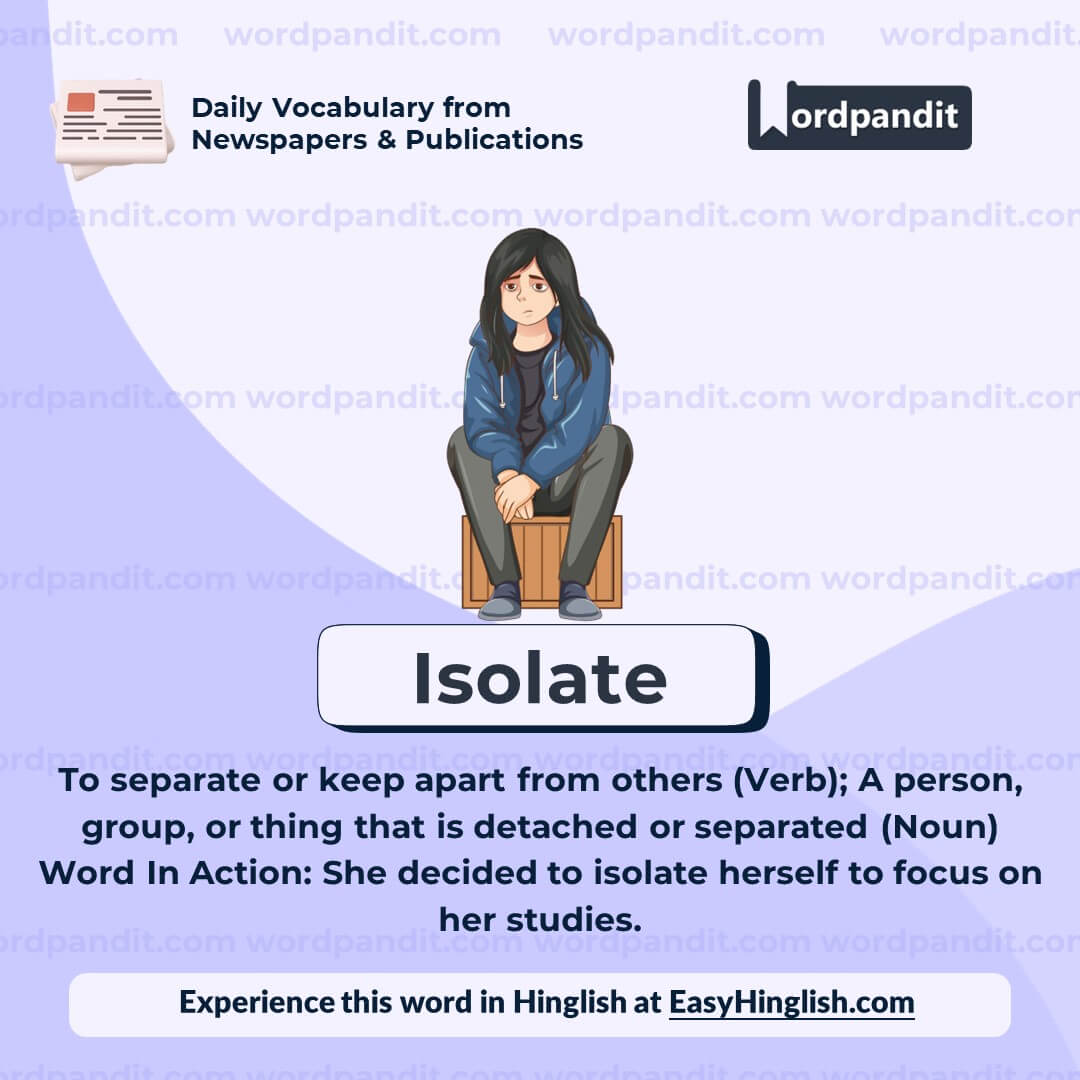Daily Vocabulary from International Newspapers and Publications
Expand Your Vocabulary with Wordpandit’s Global Vocabulary Hub
At Wordpandit, we are committed to helping you develop a truly global vocabulary by drawing from some of the most respected international publications. This section is designed to keep you ahead of the curve by introducing you to words that define global conversations and trends.
The Power of Global Sources
To help you think and communicate on a global scale, we curate vocabulary from renowned international sources, such as:
- The New York Times
- The Washington Post
- BBC
- The Guardian
- The Economist
- Scientific American
- Psychology Today
- And many more...
Stay Global, Stay Competitive
Our daily updates from international publications ensure you are consistently exposed to new words that reflect global news and developments, making sure your vocabulary is not only current but also globally relevant.
Enhance Your Global Perspective
Whether you’re preparing for international exams, aiming to excel in global business communication, or want to enhance your language skills for personal growth, Wordpandit offers the resources you need to thrive in a global context.
Effective Learning, Global Reach
Our learning methodology combines global examples, memory aids, and interactive activities, allowing you to internalize new words effectively and apply them in real-world scenarios.
Begin Your Global Vocabulary Journey Now!
Why Choose Wordpandit?
Practical Learning: Focus on words you'll actually encounter in real-world reading, enhancing your comprehension and communication skills.
Diverse Content: From current affairs to scientific breakthroughs, our varied sources expose you to vocabulary across multiple domains.
Effortless Integration: Make Wordpandit a part of your daily routine. Just a few minutes each day can significantly boost your lexicon over time.
Your Path to Vocabulary Mastery
- Visit our Daily Vocabulary section regularly
- Explore new words and their usage in context
- Practice incorporating these words into your own writing and speech
- Track your progress as your vocabulary expands
Start Your Journey Today
Embark on your vocabulary enhancement journey with Wordpandit. By consistently engaging with our daily posts, you'll build a robust vocabulary that serves you well in academic, professional, and personal contexts.
Remember, a word a day keeps linguistic limitations at bay. Make Wordpandit your daily companion in the quest for vocabulary excellence!
WORD-1: Frantic
Context:
"Noah would no doubt, by this time, have been making frantic calculations about load distribution, ballast, stress and tipping balances, not to mention the logistics of food supply and waste disposal." - Aeon
Explanatory Paragraph:
The word "frantic" describes a state of extreme urgency, panic, or uncontrollable excitement. It often conveys a sense of desperation or chaos, as when someone is rushing to complete a task under pressure or reacting to a stressful situation with great agitation.
Meaning: Feeling or showing extreme fear, worry, or excitement (Adjective)
Pronunciation: FRAN-tik
Difficulty Level: ⭐⭐ (Beginner-Intermediate)
Etymology: From Middle English *frantik*, meaning "insane, mad," derived from Old French *frantic*, which in turn comes from Latin *phreneticus*, meaning "delirious" or "frenzied."
Synonyms & Antonyms:
Synonyms: Hysterical, frenzied, panicked, agitated, desperate
Antonyms: Calm, composed, collected, serene
Usage Examples:
- She made a frantic search for her lost keys before leaving for work.
- The mother became frantic when she couldn't find her child in the crowded mall.
- As the deadline approached, the office was filled with frantic typing and hurried conversations.
- The dog ran in frantic circles, excited to see its owner return home.
Cultural Reference:
"Frantic" is often used in literature and film to depict intense emotional moments. A famous example is the 1988 thriller movie *Frantic*, directed by Roman Polanski, which follows a desperate American doctor searching for his kidnapped wife in Paris.
Think About It:
Can you recall a time when you felt frantic? What caused the situation, and how did you manage it?
Quick Activity:
Write a short paragraph describing a situation where someone might behave in a frantic manner. Try to use at least two synonyms of the word.
Memory Tip:
Think of the word "frantic" as "frantic ants" running around in a panic when their anthill is disturbed.
Real-World Application:
The word "frantic" is useful when describing stressful or urgent situations in daily life, such as last-minute preparations, emergencies, or moments of extreme emotion.
WORD-2: Extinction
Context:
"Species are, for want of a better term, easy. Look, for instance, at how we speak about extinction." - Aeon
Explanatory Paragraph:
"Extinction" refers to the complete disappearance of a species, group, or phenomenon. It commonly describes the loss of plant or animal species when no living members remain. While extinction is often associated with natural history and environmental science, it can also be used metaphorically to describe the decline or end of traditions, languages, or ways of life.
Meaning: The state or process of a species, family, or group ceasing to exist (Noun)
Pronunciation: ik-STINK-shun
Difficulty Level: ⭐⭐⭐ (Intermediate)
Etymology: From Latin *extinctio*, derived from *extinguere*, meaning "to put out" or "quench," originally referring to putting out a fire before evolving into its modern sense of total disappearance.
Synonyms & Antonyms:
Synonyms: Disappearance, eradication, annihilation, extermination
Antonyms: Survival, existence, preservation, continuation
Usage Examples:
- Scientists warn that climate change could accelerate the extinction of many species.
- The extinction of the dinosaurs is believed to have been caused by an asteroid impact.
- Many indigenous languages are at risk of extinction due to globalization.
- The conservation team works tirelessly to prevent the extinction of endangered animals.
Cultural Reference:
The idea of extinction has been widely explored in movies, literature, and documentaries. The film *Jurassic Park* (1993) revolves around the concept of bringing extinct species back to life, sparking discussions on ethics and science.
Think About It:
Do you think human actions can prevent extinction, or is it an inevitable part of evolution?
Quick Activity:
Research an extinct species and write a short paragraph explaining why it disappeared and whether its extinction could have been prevented.
Memory Tip:
Think of the word "extinction" as "exit" + "existence"—when something exits existence, it becomes extinct.
Real-World Application:
Understanding extinction helps in conservation efforts, environmental policies, and raising awareness about biodiversity loss. It also has implications in cultural and historical contexts, such as the extinction of languages and traditions.
WORD-3: Enriched
Context:
"Offers not only scientific clarity and variety, but an enriched view of the living world and our relationship with it." - Aeon
Explanatory Paragraph:
The word "enriched" describes something that has been improved, enhanced, or made more valuable. It often refers to knowledge, experiences, or substances that have been strengthened by adding something beneficial. In various contexts, "enriched" can relate to education, food, environments, or even perspectives, signifying a deeper or more meaningful quality.
Meaning: Made richer, improved, or enhanced in quality (Verb, past participle; Adjective)
Pronunciation: en-RITCHT
Difficulty Level: ⭐⭐ (Beginner-Intermediate)
Etymology: From Old French *enrichir*, meaning "to make rich," derived from Latin *in-* (into) + *riche* (wealthy).
Synonyms & Antonyms:
Synonyms: Enhanced, improved, fortified, deepened, refined
Antonyms: Depleted, diminished, weakened, impoverished
Usage Examples:
- Reading a wide range of books has enriched my understanding of different cultures.
- The bread is enriched with vitamins and minerals to improve nutrition.
- Traveling to new places has enriched her life with unforgettable experiences.
- The museum visit enriched the students' knowledge of ancient civilizations.
Cultural Reference:
Education is often described as an "enriching experience," highlighting the value of knowledge and learning. Many organizations emphasize "enrichment programs" to help students develop skills beyond traditional academics.
Think About It:
What experiences or activities have enriched your life the most? How did they contribute to your personal growth?
Quick Activity:
Write a short paragraph describing a situation where something became enriched, whether it’s an experience, a lesson, or even food.
Memory Tip:
Think of "enriched" as "adding richness"—whenever something gains value or depth, it becomes enriched.
Real-World Application:
The concept of enrichment applies in various fields, such as education (enriched learning), nutrition (enriched food), and personal growth (enriched experiences). It highlights improvement and added value in everyday life.
WORD-4: Aggregate
Context:
"Species has long been the basic unit of zoology. Ernst Mayr’s 1951 definition still fits: ‘An aggregate of interbreeding natural populations which are not only reproductively isolated from other such aggregates but also ecologically specialised sufficiently so as not to compete with other such species.’" - Aeon
Explanatory Paragraph:
The word "aggregate" refers to a collection or group of distinct items that are gathered together to form a whole. It is commonly used in scientific, mathematical, and business contexts to describe the sum or total of multiple elements. In biology, as seen in the context above, "aggregate" refers to a collection of populations that function as a unit. The term can also be used in economics (aggregate demand), construction (aggregate materials), and statistics (aggregate data).
Meaning: A whole formed by combining several elements (Noun); To collect or gather into a whole (Verb); Formed by the combination of several elements (Adjective)
Pronunciation: AG-ri-gayt (verb); AG-ri-git (noun/adjective)
Difficulty Level: ⭐⭐⭐ (Intermediate)
Etymology: From Latin *aggregatus*, meaning "collected," from *ad-* (toward) + *gregare* (to gather), derived from *grex* (flock or herd).
Synonyms & Antonyms:
Synonyms: Collection, total, sum, mass, cluster, accumulation
Antonyms: Individual, separate, isolate, divide
Usage Examples:
- The website aggregates news from multiple sources to provide comprehensive updates.
- In construction, concrete is made using sand, gravel, and other aggregates.
- The company reported its aggregate sales for the year, combining revenues from all branches.
- Social scientists often analyze aggregate data to identify large-scale trends.
Cultural Reference:
In sports, "aggregate score" is a common term in tournaments where scores from multiple games are combined to determine the winner, such as in European football competitions.
Think About It:
Can you think of other examples where small individual elements combine to form a larger whole in daily life?
Quick Activity:
List five examples of "aggregates" in different fields (e.g., economics, biology, construction). Explain how the concept applies in each case.
Memory Tip:
Think of "aggregate" as "a great gate" where many people gather to enter together, just like how different elements come together to form a whole.
Real-World Application:
"Aggregate" is frequently used in data analysis, business reports, and science. Understanding its meaning helps in fields like economics (aggregate demand), construction (aggregate materials), and social sciences (aggregate behavior).
WORD-5: Isolate
Context:
"Species has long been the basic unit of zoology. Ernst Mayr’s 1951 definition still fits: ‘An aggregate of interbreeding natural populations which are not only reproductively isolated from other such aggregates but also ecologically specialised sufficiently so as not to compete with other such species.’" - Aeon
Explanatory Paragraph:
The word "isolate" means to set apart, separate, or keep something or someone away from others. It can be used in various contexts, such as biology (isolating a species), medicine (isolating a virus), psychology (feeling isolated), and technology (isolating data or electrical circuits). In the given context, "reproductively isolated" means that certain populations do not interbreed with others, keeping them genetically distinct.
Meaning: To separate or keep apart from others (Verb); A person, group, or thing that is detached or separated (Noun)
Pronunciation: EYE-so-layt
Difficulty Level: ⭐⭐ (Beginner-Intermediate)
Etymology: From Latin *insulatus*, meaning "made into an island," derived from *insula* (island), reflecting the idea of being cut off or detached.
Synonyms & Antonyms:
Synonyms: Separate, detach, quarantine, seclude, insulate
Antonyms: Connect, integrate, include, unite
Usage Examples:
- The scientist needed to isolate the bacteria to study its characteristics.
- During the pandemic, many people felt isolated due to lockdowns and social distancing.
- The engineers worked to isolate the faulty electrical circuit to prevent further damage.
- He chose to isolate himself from negative influences to focus on his goals.
Cultural Reference:
The term "isolation" is often used in literature and films to depict loneliness or survival challenges. For example, in *Cast Away* (2000), the protagonist is isolated on an uninhabited island, highlighting both physical and emotional struggles.
Think About It:
In what ways can isolation be beneficial, and in what ways can it be harmful?
Quick Activity:
Write a short paragraph about a situation where someone or something needs to be isolated. Use at least two synonyms of the word.
Memory Tip:
Think of "isolate" as "I solo late"—when you're solo (alone) for a long time, you're isolated!
Real-World Application:
"Isolate" is a crucial word in discussions about health (isolation in disease control), science (isolating compounds in chemistry), and psychology (social isolation and mental health). It helps describe situations where separation is necessary or significant.



















